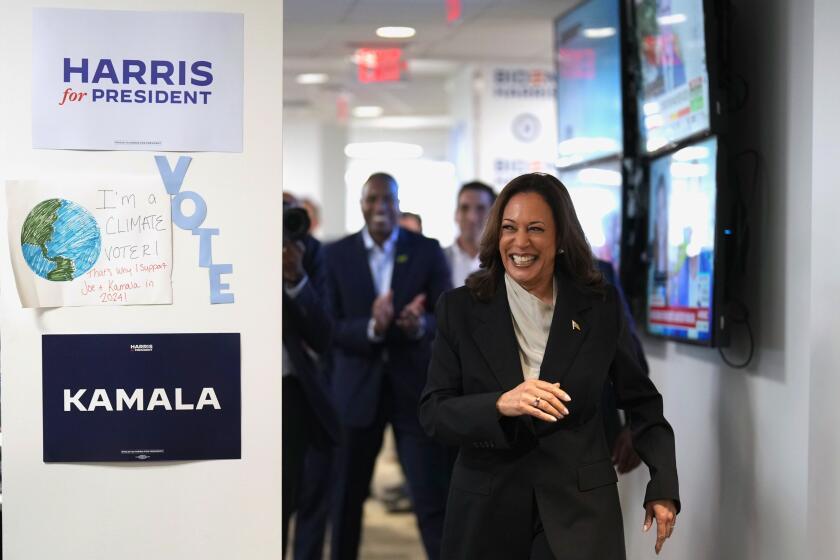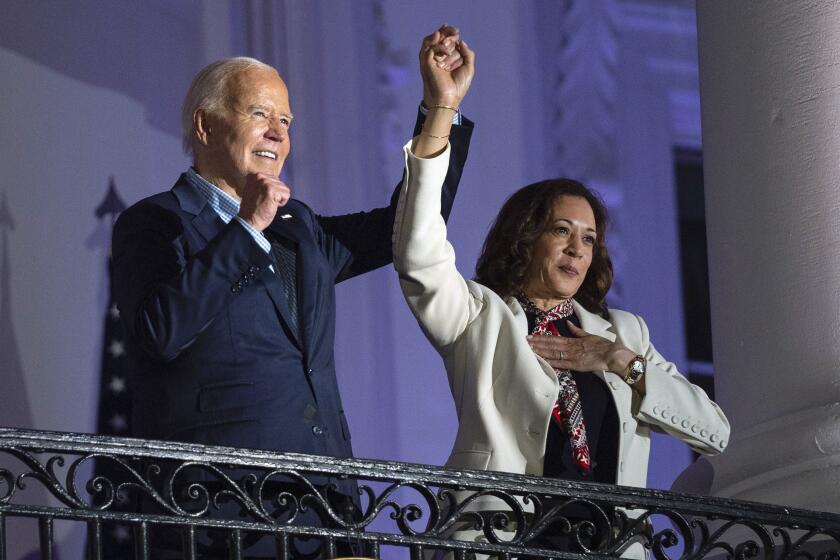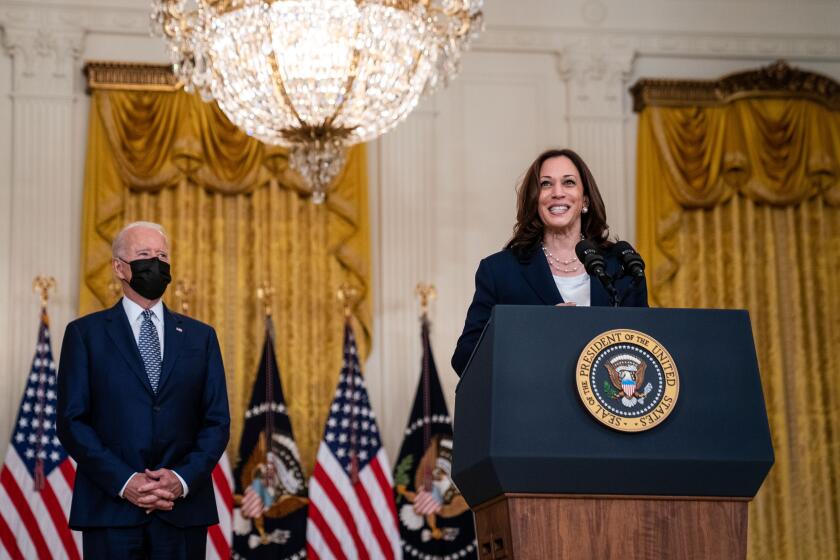A Justice Born for the Ages
Arguing before the Supreme Court is not for the timid or the easily unnerved.
The justices interrupt the lawyers with ever-sharper questions. Then when an attorney tries to offer an answer, he is likely to be cut off by scornful jabs from other justices.
But nearly every contentious argument has a gentle interval. Sitting quietly in the middle of the bench is the white-haired Justice John Paul Stevens, sporting a bow tie and broad-rimmed glasses. He watches intently like an old owl, waiting until the fury of his colleagues subsides.
“Counsel, may I inquire about one aspect of your argument?” he sometimes begins, leaning forward as if in conversation.
Unfailingly courteous, Stevens never attacks the lawyers, mocks their arguments or wisecracks at their expense. He listens intently to their answers.
“Can you clarify what you mean?” he asks one advocate. “I’m not sure I understand your position,” he tells another.
The Supreme Court’s oldest and most polite justice turns 82 on Saturday, but there are few signs he is slowing down or tiring of the job. Indeed, Stevens has the buoyant energy of a person decades younger, and he remains one of the court’s quickest wits, sharpest thinkers and best writers.
Appointed in 1975 by President Ford, Stevens was lauded from the start as exceedingly smart, strictly nonpartisan and highly independent.
But he was also seen as something of a puzzle. He did not line up with the dominant liberals, such as William J. Brennan Jr. and Thurgood Marshall, who believed the death penalty was unconstitutional.
He also steered away from the conservatives, who wanted to roll back the right to abortion and break down the “wall of separation” between church and state. Stevens went his own way and had a reputation in legal circles of being unpredictable.
“We don’t know what to make of a judge who doesn’t have an agenda,” said Kenneth Manaster, a Santa Clara University law professor.
Manaster’s recent book, “Illinois Justice,” describes how Stevens emerged as a figure of old-fashioned integrity in a Chicago scandal that brought down two of the state’s top judges.
Stevens, Manaster said, has “a real commitment to following the law, case by case. That doesn’t make for an easy headline, but it’s exactly what a judge should do.”
However, as the aged liberals on the court departed and the majority shifted right, Stevens emerged as one of most influential justices and leader of its liberal wing. Next in seniority to Chief Justice William H. Rehnquist, he assigns the writing of opinions when the chief justice is not in the majority.
There is debate among legal academics over whether Stevens moved to the left or stayed the same while the court moved to the right. Either way, Stevens has become the most consistently liberal voice on a conservative-leaning court.
More often than not, he is speaking in dissent. Frequently, he does so with dismay, as if to say his colleagues have failed to live up to their high calling.
When the court ended the Florida recount in the Bush vs. Gore case, Stevens’ dissent was memorable.
“Although we may never know with complete certainty the identity of the winner of this year’s presidential election, the identity of the loser is perfectly clear. It is the nation’s confidence in the judge as the impartial guardian of the rule of law,” he concluded.
He Writes His Own Opinions
Unlike his colleagues, he insists on writing his own opinions, often drafting them at home early in the morning. He then has his clerks fill in the footnotes and citations.
Clerks are awed by his ability to write clear decisions quickly and by his phenomenal memory.
“He would disappear over the weekend and come back with several opinions written,” said Randolph Moss, a former Justice Department lawyer who clerked for Stevens in the early 1990s. “He would mention he wrote something on that a while ago and that it’s at [Volume] 447, about [citation] 557 or 558.”
Supreme Court opinions are published in volumes and lawyers rely on the citations to those volumes. But few can remember volume and page citations.
“Sure enough, you would go look up Volume 447 at 557, and there would be the opinion to cite,” Moss said.
Stevens also believes he and his clerks must look at all appeal petitions that arrive at the court--more than 7,000 per year.
The other eight justices “pool” their law clerks and assign one of them to digest each petition. That person, usually a recent law school graduate, writes a memo setting forth the legal issue and recommending whether it be heard by the full court or dismissed.
Stevens uses three clerks, not the usual four. And over the years, he has had more minorities and women as clerks than any other justice, as well as several with physical disabilities.
His wide-ranging opinions include a landmark ruling that allowed the government to regulate “indecent” broadcasts on radio and television in the famous case involving comedian George Carlin’s “seven dirty words.” He has questioned why pornography has been given the highest free-speech protection but advertising has not.
The World War II veteran read an impassioned dissent in 1989 when the court upheld the burning of the American flag as protected free expression.
And soon after joining the court, Stevens cast a key vote to restore the constitutionality of capital punishment.
Yet he also steadily supported civil rights laws, a woman’s right to abortion and the separation of church and state doctrine--views that have made him anathema to some conservatives.
USC law professor Susan Estrich, who clerked for Stevens in 1977, calls him “a throwback to a less rancorous era, when law and politics were noble pursuits, not blood sports.”
Ex-Law Dean Gives Stevens Top Marks
Former Northwestern University law dean Robert Bennett has called Stevens “the finest the American legal system has to offer.”
Stevens graduated first in his Northwestern Law School Class of 1947, and “we like to brag about him,” Bennett said.
Stevens’ boyhood in the 1920s offered him a glimpse of the wider world. His father built the largest hotel in Chicago along South Michigan Avenue. Now called the Chicago Hilton and Towers, it was first known as the Stevens Hotel.
He met some of the greatest figures of the era, visiting the suite of Charles Lindbergh, who was touring the country after his New York-to-Paris flight in 1927, and Amelia Earhart, the aviation pioneer.
He also recalls a trip to Wrigley Field for the 1932 World Series. Babe Ruth pointed to the grand stands and hit the next pitch there, the famous “called-shot” home run.
As an undergraduate at the University of Chicago, Stevens was an English major. He joined the Navy on Dec. 6, 1941, and won a Bronze Star for his work as a code breaker.
“He has both remarkable intelligence and great modesty, and that’s not a combination you find frequently,” Bennett said.
His unassuming manner has even fooled his next-door neighbors.
He and his wife, Maryan, have a condominium in Fort Lauderdale, Fla., and during much of the year, Stevens flies south for long weekends. But many of his neighbors and tennis partners apparently do not know that the genial white-haired lawyer from Washington is a member of the Supreme Court.
Though a registered Republican, Stevens was never involved in partisan politics. Oddly enough, he was propelled to the high court by two political scandals.
In the summer of 1969, Sherman Skolnick, a Chicago gadfly, loudly accused the Illinois Supreme Court justices of corruption, and the Chicago newspapers picked up the charge. A state court commission was set up to look into the allegations, and its members asked Stevens, a little-known Chicago lawyer, to serve as something of an independent counsel.
He took no pay for the work, but within six weeks he investigated the charges, took depositions from the key participants, heard testimony in public from the justices and wrote a final report. It found that two justices, Roy Solfisburg and Ray Klingbiel, had secretly taken stock in a Chicago bank that was controlled by a Democratic Party operative, Theodore Isaacs. They then voted as justices to throw out a criminal indictment against Isaacs.
Shortly after Stevens filed his report, the two justices resigned. Stevens sought no publicity for himself. He did not hold news conferences or do television interviews.
He was widely praised for his performance, and in 1970, Sen. Charles Percy of Illinois persuaded President Nixon to appoint him to U.S. 7th Circuit Court of Appeals.
In 1975, after the Watergate scandal toppled Nixon, President Ford turned to Stevens after legendary liberal Justice William O. Douglas retired. Stevens had been recommended by Atty. Gen. Edward H. Levi. Stevens had taught at the University of Chicago Law School, where Levi served as dean.
The nomination was met with universal praise, and three weeks later, he was unanimously confirmed by the Senate.
He Speaks Out Against Conservative Activism
In recent years, Stevens has spoken against the conservative activism of his colleagues. They have struck down a series of federal laws, such as the Violence Against Women Act and the Gun-Free School Zones Act, and have said these measures invade the “sovereignty” of the states.
Stevens has dissented each time. Often, he tweaks his conservative colleagues by citing their words against them.
Two years ago, for example, the court struck down California’s “open primary” law as a violation of the free-speech rights of the state parties.
“A state’s power to determine how its officials are elected is a [key element] of its sovereignty,” Stevens said in dissent. “In my view, the principles of federalism require us to respect the policy choices made by the state’s voters in approving Proposition 198.”
Stevens also protested when the conservatives set aside New Jersey’s ban on discrimination against gays and lesbians in a case brought by the Boy Scouts of America. Speaking for the four dissenters, Stevens said he did not see how the anti-bias law violated the 1st Amendment. “The court does not accord this courageous state the respect that it is its due,” he wrote.
When several justices called for striking down campaign funding limits as a free-speech violation, Stevens wrote the clearest defense.
“Money is property; it’s not speech,” he wrote. “Speech has the power to inspire volunteers to perform a multitude of tasks on the campaign trail, on a battleground, or even on a football field. Money, meanwhile, has the power to pay hired laborers to perform the same tasks.” Since the government can regulate property, it should be permitted to regulate campaign money as well, he said.
Perhaps his best-known dissents came in the Bush vs. Gore case that ended the Florida election recount and cleared the way for President Bush’s victory.
On Saturday morning, Dec. 9, 2000, hours after the Florida Supreme Court had ordered a statewide tally of the remaining untabulated ballots, the Supreme Court stopped the count on a 5-4 vote.
Within two hours, Stevens filed a dissent.
“To stop the counting of legal votes, the majority today departs from three venerable rules of judicial restraint that have guided the court throughout its history,” he wrote.
The first rule, he wrote, is to defer to state courts on questions of state law. Second, to defer to other branches of the federal government as called for by law. Disputes over electoral votes were to be decided by the House of Representatives, according to federal law. And finally, to wait to resolve constitutional claims until the evidence is in. In Florida, the Republicans predicted the hand recount would be unfair and urged the court to block it for that reason.
“As a more fundamental matter, the Florida court’s ruling [allowing the full state recount] reflects the basic principle, inherent in our Constitution and our democracy, that every legal vote should be counted.” Stevens said.
He’s Also Strayed From Liberal Side
His dissents are not always on the liberal side. Last June, a 5-4 decision threw out a drug prosecution against an Oregon man because police had used a heat-sensing device to spot marijuana plants growing in his house. Justice Antonin Scalia said it is unconstitutional to use these extrasensory devices to detect wrongdoing.
Disagreeing, Stevens questioned the wisdom of outlawing sensing devices that, for example, can detect chemicals used by bomb makers, a dissent that seemed prescient after Sept. 11.
Stevens is not the oldest justice ever to serve. Oliver Wendell Holmes retired at age 90 in 1932. Just over a decade ago, the court had three justices who had passed their 80th birthdays: Brennan, Marshall and Harry Blackmun. But they sat silently during the oral arguments and looked like tired old men in the courtroom.
In contrast, Stevens is a lively presence on the bench.
He keeps up a busy exercise schedule as well. He plays tennis three times a week, swims regularly and plays golf on occasion. He and his wife play in competitive bridge tournaments. As one concession to age, he gave up flying his airplane a few years ago.
His good health and energetic presence have enormous significance for the court and the law. Stevens has been a key figure in the 5-4 majority that supports the right to abortion. If he were to depart, President Bush would have an opportunity to create an antiabortion majority.
His continued presence is welcome for many lawyers.
“He hasn’t changed at all over the years,” said Washington attorney Carter G. Phillips, who argues regularly before the court. “He always asks questions with the same grace and elegant style. You never get the feeling he is trying to score points at your expense.”
He sits between Rehnquist and Scalia. Sometimes, he steps in to rescue an attorney who has been thrown off-balance by Scalia’s barrage of sharp questions.
Once, a flustered lawyer answered several questions by saying, “Well, judge . . . “
Rehnquist reprimanded him and reminded the lawyer that the members of the high court are “justices.”
“Counsel, you’re in good company,” Stevens said, propping up the shaken advocate. “The Constitution makes the same mistake,” since it too speaks in less exalted terms of the “judges of the Supreme Court.”
More to Read
Get the L.A. Times Politics newsletter
Deeply reported insights into legislation, politics and policy from Sacramento, Washington and beyond. In your inbox three times per week.
You may occasionally receive promotional content from the Los Angeles Times.







